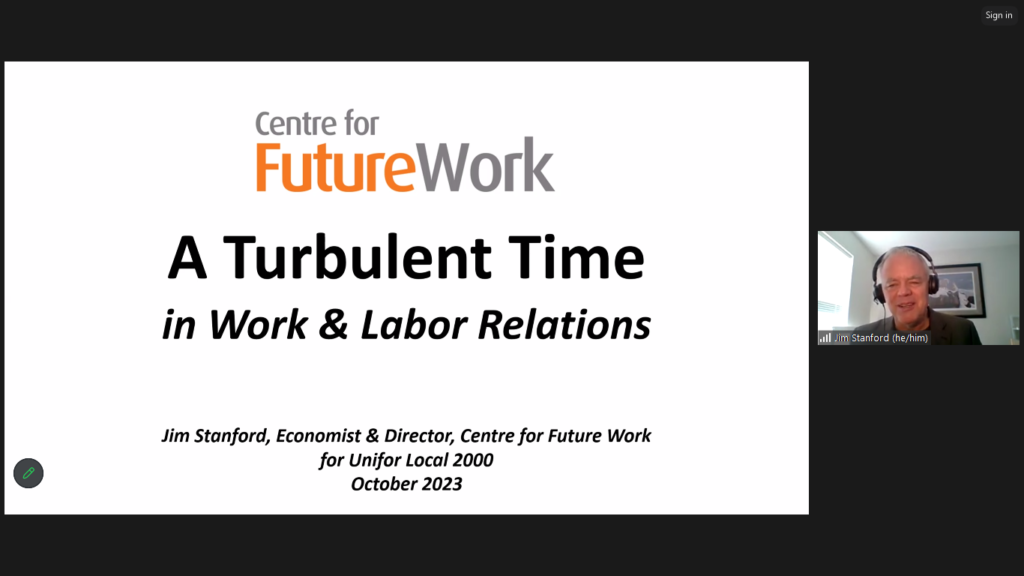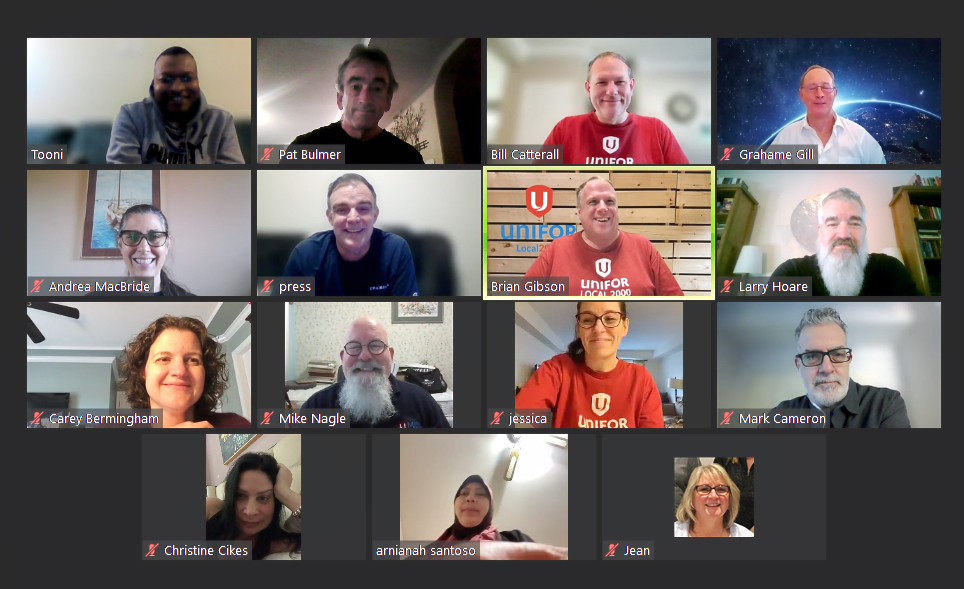Unifor 2000 held our annual congress Oct. 28 in a Zoom meeting.
A lot of decisions were made, some good information passed along and key elections held in a packed four-hour meeting.
Next year, our local will turn 140 years old. We’ll be looking for ways to mark this anniversary. That may include an in-person congress.
Some highlights:
Elections included President Brian Gibson being acclaimed to another three-year term. We also nominated members for our elections and audit committees.
Thanks was expressed to staff member Cathy Cartwright, who’s been the friend of every single member. She’s retiring, but she’ll still be around from time to time. Happy retirement Cathy.
Delegates approved two resolutions and defeated one. Bylaw changes must be approved by members in a referendum.
Resolution 1 clarified the duties of the president by adding to our bylaws that “The President shall not be a member of the Elections Committee that conducts the ballot for table officers.”
Resolution 2 removed from our bylaws a declaration that vice-presidents will be automatic delegates to the Unifor National Convention “finances permitting.” Currently, our local sends the president and secretary-treasurer to such conventions. This change will allow more people eligible to be delegates, if we decide to send more.
Resolution 3 would have changed how we determine a quorum at congress from a percentage of delegates “seated” to delegates “registered.” It was defeated.
Presidents report (Brian Gibson) – highlights from his written report.
Bell Media
“We participated in the Tears to Hope relay race where we walked/jogged a ten kilometre leg between Kitimat and Terrace. Bill Catterall, Master Steward Mike Nagle, National Representative Sandy McManus, Unifor Indigenous Liasson Gina Smoke, Human Rights Director Niki Lundquist were on team Local 2000. We raised about $1,600.”
“We have started bargaining with Bell and have met the company a couple of times. We are not too far off from an agreement, but there are a couple of outstanding issues that are important to our members, including wage increases.”
Alaska Highway News-Dawson Creek Mirror:
“We received Section 54 Notice under the BC Labour Code on Thursday October 12 that they were closing the paper on Friday, October 13th. We had three members receive their layoff notices on the Thursday. We have met with the company and continue discussions. It is a sad state of affairs with the closure of these papers that have been serving their communities in one way or another, since 1944.”
Prince George Citizen
“In August, one member of the newsroom resigned to take a better paying job at the University of Northern BC. Long time shop steward and Executive Board member Mark Nielsen took a voluntary layoff in August as well. I want to thank Mark for all his years serving the members at the Prince George Citizen and for serving on our Executive Board.”
Kamloops This Week
“We received Section 54 notice under the Labour Code on August 30 informing the Union that the employer intended to shut down the paper as of October 30, 2023. During discussions there was an idea of some sort of rescue operation for the paper. After many meetings and a lot of back and forth, we never reached critical mass to make something work … The last edition of Kamloops This Week will be on October 25th. It is a very sad situation for the community as they no longer have any newspapers in town.”
Kelowna Daily Courier/Penticton Herald
“It has been a tumultuous year at both these papers … We have two outstanding grievances. One where a new sales representative was hired, and the company has not deducted or remitted dues for them despite their performing bargaining unit work. We have another issue where a retired member has been brought back to do their old job a couple times per week and for vacation coverage, and the company again has failed to collect and remit dues.”
Mitchell Press
“We negotiated a tentative agreement in July, but members were not happy with the proposed schedule changes and voted down the agreement. We have recently had a reply to our last pass from the employer. As of the writing of this report (October 18) we are waiting for the documents and will present them to our committee and then hopefully bring a new tentative agreement for the members to consider shortly.”
Purdy’s Chocolatier
“We welcomed four newly trained shop stewards, Ankush Chopra, Desire Mulla, Arnianah Santoso and Holly Mah. We also have two new Union representatives on the Kingsway Health and Safety Committee.
“There has been a big concern from members about the increased number of shutdown days where the factory is closed, and members are off without pay or using banked time and vacation to cover those days. Usually there are two days in January and two days in July when the factory shuts down for deep cleaning and inventory counts.”
Secretary-treasurer’s servicing report (Bill Catterall) – highlights from his written report
“It was a hectic start to the year – we had a pre-bargaining meeting with members at Tri-City News, and a partial decertification application at the BC Labour Board, filed by some members at Chilliwack Progress. We also had a bad faith complaint before the BC Labour Board stemming from contract negotiations at Trail Daily Times (Black Press), bargaining talks with Mitchell Press, followed by Section 54 notice of layoffs at Pacific Newspaper Group (Postmedia).”
Pacific Newspaper Group
“In February, the Company issued Section 54 notice, giving us notice of layoffs in the Editorial and Advertising departments. As a result of our language, we were able to push the company to offer the Voluntary Buyout Offer (VBO) under the contract instead of proceeding with layoffs. The company wanted to reduce staff as part of their Sales Transformation, and we have filed grievances that relate to these anticipated changes, but the company is required to negotiate with us before any changes are made. We are still waiting to hear from the company.”
Sun Chemical
“Bargaining was completed after two days, and the new collective agreement was ratified by members. Highlights include 8.5% wage increase over 3 years, and improvements to paramedical. The company also agreed to allow employees to match employer contributions to the pension plan.”
Marine Printers
“A new contract was signed off and the new owners have taken over the company as of January 1, 2023. Our members moved with the operation from Vancouver to Richmond. We also had our first joint labour management meeting on June 6.”
Glacier Lower Mainland
“We began bargaining at Tri-City News early this year … but we ran into an impasse as the company wasn’t prepared to deliver a wage proposal. During bargaining, the company asked members to return to the office with a hybrid schedule – three days in the office, and two days working from home. The company also wanted to eliminate the Production Department, affecting three members. The offer was rejected. The company issued Section 54 Notice on July 31, where they announced that they would cease printing the New Westminster Record, Tri-City News, and Burnaby Now newspapers. All three papers would become online-only publications, and this would result in a total of 7 layoffs. We settled the Section 54 with an agreement to an adjustment plan. Bargaining at Tri-City News will resume the last week of October.”
Trail Daily Times
“We reached a settlement. The bad faith complaint was withdrawn by the employer, and the agreement has been ratified. Highlights include an increase in mileage expenses, lump-sum payments equivalent to the wage increases (5% over the last two years of the agreement), and a signing bonus.”
Black Press Lower Mainland
“Certain employees at Chilliwack Progress filed for partial decertification at the start of 2023. We opposed the application, and the company’s lawyer objected, rather vigorously, against our submissions, and demanded an additional rebuttal of our arguments. The BC Labour Board granted the application; we will appeal.”
Guest speakers
Lana Payne – Unifor national president Lana Payne was scheduled to speak, but with negotiations at the St. Lawrence Seaway and Stellantis (Chrysler) heating up, she had to send regrets. Tentative agreements were reached in both disputes on the weekend.
Jim Stanford – Centre for Future Work
Stanford had quite a bit to say about inflation, which now seems to be ebbing:
“Workers are not to blame for this inflation. This is not a case of so-called wage-price spiral. This was a worldwide pandemic. a global health and economic and social emergency. You had whole industries shut down. You had transportation chains that were stopped…”

“People still had purchasing power. The government moved very quickly to support Canadians through the pandemic …. so we had money to spend, but nothing to buy. So that’s a recipe for a bit of inflation.”
“You also had a healthy dose of greed as part of this. We saw companies that took advantage of the shortages and the breakdowns and the desperation to jack up prices as much as the market would bear. Corporate profits rose … companies literally never had it better.”
“Most of those things that caused the initial inflation are gradually resolving.”
“It’s clear that wages have lagged behind prices throughout this whole episode. Only this spring did we finally get a situation where wage growth had caught up to where prices were at. We’ve got two years of damage … two-years that wages were lagging way behind prices.”
On the current labour situation:
“We’ve been able to make some great gains both provincially and federally with governments bringing in better labour laws. Both federally and in BC we won back card-check certification. We’re working on anti-scab laws at the federal level and other changes that have made it more feasible for unions to organize.”
Work stoppages have increased lately, but “we actually still do not have very many strikes in Canada, certainly not compared to where we were at in the bad old days of the 70s and 80s.”
Randy Kitt – Unifor director of media
“Staff reductions, moving to online only and newspaper closures are the new normal. Listing all the closures is liking taking a roll-call of small-town Canada.”
Unifor is investigating putting together a how-to guide on employee takeovers, Kitt said, noting an employee takeover was talked about in Kamloops where Kamloops This Week just closed, and they have happened at CHEK TV in Victoria and the Prince Albert Daily Herald.
“When the time comes and there’s an opportunity, it often passes because we don’t have the necessary information and support to make it happen.”

Kitt showed us a video on combatting harassment against journalists. See the Unifor website: uniformedia.ca/helpishere
Re: Bill C-18, the make-Google-and-Facebook-pay-for-news bill: “Bill C-18 is not soon enough and maybe now a little too late,” said Kitt. “Publishers won’t likely see any money until the beginning of 2025.”
Facebook is pulling news now in other countries.
“The development and use of AI must be shaped by collective bargaining. The agreements should cover all aspects of AI, and its impact on employment, workers rights, remuneration, working conditions and skills development.”
Gavin McGarrigle, Unifor Western Regional Director.
“Workers are fighting for and winning good gains … but it’s not coming easy.”
Federal anti-scab legislation must be tabled by end of 2023, under Liberal-NDP agreement: “We’re the closest we’ve ever been. We have to keep the pressure on.”
Businesses are fighting it and trying to weaken it, McGarrigle warned.
“There’s been lots of bargaining going on. Just here in British Columbia, we’ve seen some amazing gains at BC Transit in Victoria … more than 5,000 members in the Lower Mainland, again another amazing deal, one of the best transit contracts in North America.

“In hospitality, these were the workers who were the first laid off in the pandemic and the last to be recalled, we’re seeing amazing gains there, too. At the Fairmont Empress in Victoria, a 97 per cent strike vote led to a three-year agreement with 14.5 per cent wage increases, COLA of an additional 1.5 per cent, more manageable work load, mandatory breaks for housekeepers, higher pensions, the list goes on,
“At the Fairmont Hotel Vancouver, they just negotiated a three-year agreement with 18 per cent wage increases over the term.”
“BC introduced pay transparency legislation this year,” but transparency’s not enough, said McGarrigle. “We told them we need pay equity legislation here in British Columbia.”
“The next election is coming up in 2024. We’ve seen changes to workers’ comp. We’ve moved from one of the lowest to one of the highest minimum wages in the country. We’ve changed the labour code, Employment Standards Act, we’ve put in protection from contract flipping. We have card check. We’re the only province that has 5 paid sick days. We saw Truth and Reconciliation Day become a stat. We’ve seen 10 skilled trades move to mandatory certification status.”
“We don’t want to lose any of this.”
Sgt. David Smith, BC RCMP labour liaison
This is the man who can tell you what you can and can’t do on a picket line.
“Call me if you’ve got strike votes or want to do a rally.”
He offered a couple of legal scenarios:
“Unifor 2000’s going on strike … you have a secret meeting. Can someone in that meeting secretly tape record what you’re doing and then secretly give it to management?
Yes, Smith said, but then he offered a way to prevent it.
“It’s perfectly legal. In Canada, the Criminal Code says one-party consent. As long as you’re part of the conversation, you can tape record it. You do not have to advise anyone that you’re tape recording it.
“How do you get away from that?

“When you have a meeting you want secret, you have a signed document saying you will not release or no recording allowed of this meeting that you have that person sign.”
“Can you film people crossing a picket line and put it on Facebook and call them a bunch of scabs?”
“It’s legal,” Smith said. Calling them a scab is OK, but other insults may be defamatory, so be careful, he advised.
Can you be loud on a picket line? If it’s within local bylaws and within reason and union-related, then it’s OK.
“We are not only the civil disobedience capital of the world, we are the injunction, enforcement case capital of Canada. There are a lot of injunctions and enforcements that come out here.”
“At times of strike, talk with me and I’ll tell you how to avoid them at all costs and what management is looking for.”
National rep Andrea MacBride said Smith was great help to Unifor during disputes in Prince George and Chetwynd: Smith’s advice made a big difference with “officers who didn’t understand what we were doing,” she said.
“Give us notice before anything happens. It works better,” Smith said.
Email: [email protected]
-30-


Recent Comments